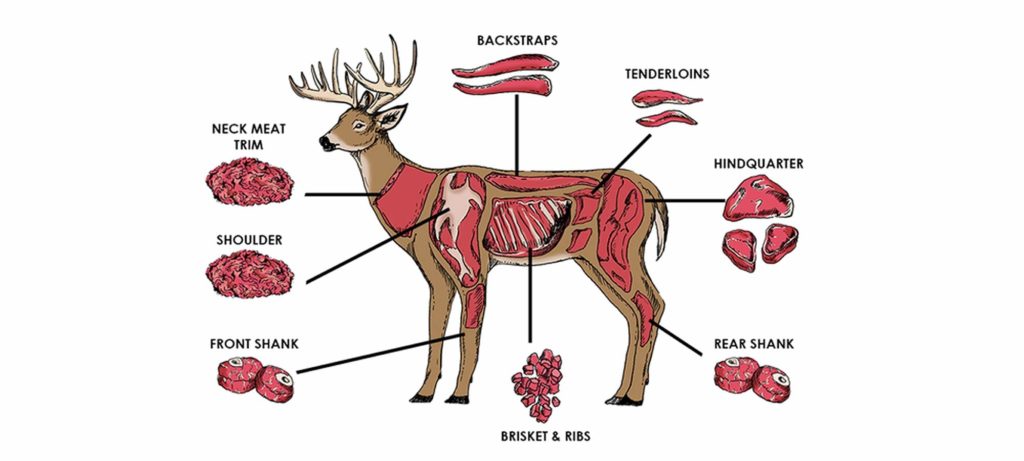Is Deer Meat Good for You? A Nutrition Guide

In recent years, there has been a growing interest in alternative sources of lean protein, and one such option that has gained popularity is deer meat, also known as venison. For centuries, various cultures around the world have included venison in their diets, and today, many individuals are turning to this lean and flavorful meat as a nutritious alternative to more conventional options. In this nutrition guide, we will delve into the health benefits of deer meat, exploring its nutritional profile and considering its place in a well-balanced diet.
Protein Packed and Low in Fat:
One of the primary reasons individuals opt for deer meat is its impressive protein content. Venison is a rich source of high-quality protein, essential for muscle growth, repair, and overall bodily function. A 3-ounce serving of cooked venison provides around 26 grams of protein, making it a protein powerhouse that can rival more common meats like beef and chicken.
Furthermore, deer meat is notably low in fat, particularly saturated fat. Excessive saturated fat consumption has been linked to various health issues, including heart disease. Venison’s low-fat content makes it an attractive option for those looking to maintain a healthy cardiovascular system and manage their weight. In comparison to traditional meats, venison offers a leaner alternative without compromising on flavor.
Essential Nutrients:
Beyond protein, deer meat is a rich source of essential nutrients that contribute to overall well-being. Venison is notably high in iron, a crucial component for the formation of red blood cells and oxygen transport throughout the body. Iron deficiency can lead to fatigue and decreased immune function, making the iron content in deer meat particularly beneficial.
Additionally, venison is a good source of zinc, a mineral essential for immune function, wound healing, and DNA synthesis. Zinc is not only vital for a robust immune system but also plays a role in maintaining healthy skin and promoting proper growth and development.
Vitamins such as B12 and B6 are also present in venison, contributing to nerve function, the formation of red blood cells, and energy metabolism. Including deer meat in your diet can be a valuable way to boost your intake of these essential vitamins.
Omega-3 Fatty Acids:
While not as abundant as in fatty fish, deer meat does contain omega-3 fatty acids, which are renowned for their cardiovascular benefits. These healthy fats have been associated with a reduced risk of heart disease, improved cognitive function, and anti-inflammatory properties. Choosing venison as a protein source can contribute to a more balanced omega-3 to omega-6 fatty acid ratio in your diet, promoting overall heart health.
No Hormones or Antibiotics:
Another aspect that often attracts health-conscious consumers to venison is that deer are typically raised in the wild and not subjected to the same hormonal and antibiotic treatments as conventionally raised livestock. This can be particularly appealing to those looking to reduce their exposure to potentially harmful substances found in some commercially raised meats.
Environmental Considerations:
Beyond its nutritional value, choosing deer meat also has potential environmental benefits. Sustainable hunting practices can help control deer populations, preventing overgrazing and ecosystem imbalance. By consuming venison, individuals may indirectly contribute to wildlife management efforts and reduce their carbon footprint associated with traditional livestock farming.
Considerations and Precautions:
While deer meat offers numerous nutritional benefits, it is essential to be aware of potential considerations and precautions. One concern is the risk of consuming meat contaminated with diseases such as chronic wasting disease (CWD) in deer populations. To mitigate this risk, hunters and consumers should follow guidelines provided by wildlife and health authorities to ensure the safety of the meat.
Conclusion:
Deer meat can be a nutritious and flavorful addition to a well-balanced diet. With its high protein content, low fat, essential nutrients, and potential environmental advantages, venison presents a compelling alternative to more conventional meat options. However, it is crucial to approach the consumption of deer meat with awareness of potential risks, such as diseases in the deer population. As with any dietary choice, moderation and a balanced approach are key to reaping the nutritional benefits of venison while ensuring overall health and well-being.




